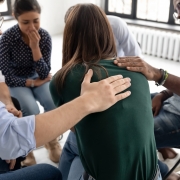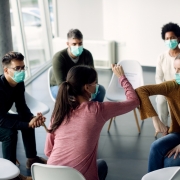Preparing for the Transition to a Post-Pandemic Summer in Addiction Recovery
While we’re not out of the woods just yet, the COVID-19 pandemic is undoubtedly entering a different stage with looser restrictions and a return to normalcy on the horizon. What that means exactly is anybody’s best guess. What we do know is that there will be many changes amidst this transition. This means that those in recovery and treatment need to be prepared to react to all of these changes and adjust to this new environment that will test their resolve and mentality.
Facing Uncertainty and the Unknown
As society begins opening back up and we all prepare for a return to a “new normal,” there’s a lot of uncertainty and anxiety over what this entails. With so much that is unknown, this can be a difficult time for those that are newer to addiction recovery or have relapsed during the pandemic. It’s important to approach this next transition stage with patience and calm. We encourage you to take things slowly and not rush into making any huge changes to your daily routine. Focus on a day at a time and don’t feel the need to do anything drastic.
Social Pressures
With loosening restrictions and a steady increase in outdoor events, those who are in recovery may feel pressured to get involved in social situations and occurrences. This is understandable because of the amount of time that we have spent isolated and away from others. While we don’t advise you to continue your isolation, we do urge you to be careful of putting yourselves in risky social environments that feature drug and alcohol use. Instead, act with caution and only involve yourself in safe social settings that won’t be a risk to your health and well-being.
Possible Changes in Treatment
One of the unfortunate effects of the pandemic has been a rise in substance abuse. This means that the post-pandemic period will likely see more patients in rehab treatment centers. This could affect the treatment of those currently in recovery because the influx of more patients may force facilities to adjust their scheduling and their approach. We encourage those currently in recovery to talk with those in charge of their addiction treatment to see if changes are anticipated. If changes are coming, work with those in charge to adapt to your new circumstances.
Overcoming addiction can be difficult enough without the uncertainty brought upon by the post-pandemic period. Now more than ever, proper guidance and support are needed for those recovering from addiction. At Twin Town Treatment Centers, we operate six facilities throughout the Los Angeles and Orange County area, including one in Laguna Hills, where our certified team works to provide an environment that is welcoming and open for those on their journey toward recovery. Get in touch with us by calling us at (866) 594-8844 or filling out our online form to get started today. Our team of professionals will provide you with a no-cost interview and assessment for alcohol and drug issues.











